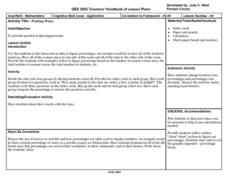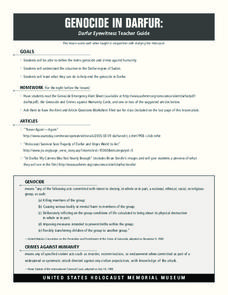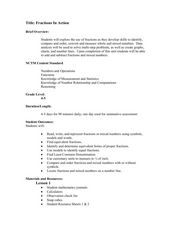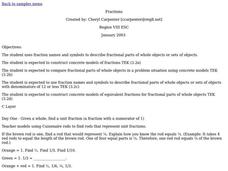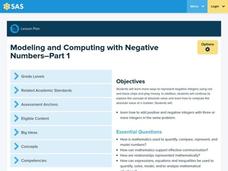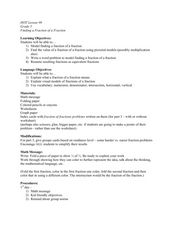Curated OER
Part-Part-Whole
In this mathematics worksheet, students identify a whole number as a combination of two smaller parts. They use counters to help them add various combinations of numbers.
Curated OER
The Whole is More Than Half
Students explore number sense by completing a food related fraction activity. In this parts of a whole lesson, students utilize a graham cracker to divide and identify what a quarter, third, or half looks like. Students eat their snack...
Curated OER
Parting Ways
Students become part of the solution as they practice figuring percents. The number of men versus women present in the room and their heights can be used to form the basis of this investigation.
Curated OER
Keynote Digital Parts of Speech
Learners create a parts of speech digital presentation. In this parts of speech lesson, students create a slide show with audio, pictures, movies, and text. They combine their slides to project the entire project.
EngageNY
Problem Solving When the Percent Changes
Use more than one whole to solve percent problems. The ninth installment in a 20-part series has pupils work percent problems in which they must determine two wholes. Individuals use double number lines to represent and solve the...
US Holocaust Museum
Genocide in Darfur: Darfur Eyewitness Teacher Guide
The events of the Holocaust in World War II would never happen again, right? Scholars research the current genocide taking place in Darfur. Using video and Holocaust Reading Passages, they analyze the horror of this forgotten part of the...
Curated OER
Fractions in Action
Investigate equivalent fractions with your class. They compare and order fractions. Then they work cooperatively in groups to experiment and problem solve with fractions using a game format. Multiple resources are provided.
Curated OER
Comparing Apples With Apples 1
Elementary schoolers observe and demonstrate how to add and subtract fractions with like denominators. They observe the teacher model a variety of fraction addition and subtraction problems and use fraction strips to complete a worksheet.
Curated OER
Multiplying With Nine As A Factor
Elementary math minds complete various activities to memorize the multiples of nine. They watch a PowerPoint presentation and demonstrate the finger trick. Unfortunately the link to the multiplication activities does not take you...
Kenan Fellows
Use of Dichotomous Keys to Identify Stream Organisms
What kind of organisms are living in the stream? After an explanation on how to use a dichotomous key, groups of three to four use the keys to identify macroinvertebrates from a local freshwater stream. Using the the concept of...
Curated OER
Lesson 2: The Constitution: Our Guiding Document
Explore the structure and content of the US Constitution in the second lesson of this five-part social studies series. A collection of activities, games, and videos complement a class reading of a document summarizing the US...
EngageNY
Solving General Systems of Linear Equations
Examine the usefulness of matrices when solving linear systems of higher dimensions. The lesson asks learners to write and solve systems of linear equations in four and five variables. Using matrices, pupils solve the systems and apply...
University of Minnesota
Connect the Neurons!
Create a neuron frenzy as your pupils play the part of the neurons. An engaging activity creates a human chain of neurons that pass cotton balls posing as neurotransmitters. Scholars learn about pre- and post-synapses as they...
California Academy of Science
Earthquakes and Tectonic Plates
Here is a comprehensive package in which middle schoolers learn about types of seismic waves, triangulation, and tectonic plate boundaries. Complete vocabulary, colorful maps, and a worksheet are included via links on the webpage. You...
Macmillan Education
Christmas: #SadTree
Christmas trees can be as large and elaborate as the tree in Rockefeller Center, or as small and understated as Charlie Brown's tree in A Charlie Brown Christmas. But where did the tradition of Christmas trees come from? An engaging...
Science Matters
Matter Cycles — Sum It Up
Scholars become part of the cycle of matter with a reader's theater that showcases producers, consumers, decomposers, and the sun. A diagram and discussion concludes the learning experience and enhances comprehension.
Curated OER
Fractions
Young mathematicians use fraction names and symbols to describe fractional parts of whole objects or sets of objects. They construct concrete models of fractions, and compare fractional parts of whole objects in a problem situation using...
Curated OER
Understanding Fractions - Cookbook Comparisons
Learners explore equal fractions in relationship to a whole unit. They fold strips of paper into halves, thirds, etc. and compare them to the first strip which represents a "whole unit." Fractional parts are identified and compared.
Curated OER
Introduction to Equivalent Fractions
Explore equivalent fractions! Youngters measure the crown of their head with adding tape labeled with various fractions and fractional parts, and compare strips to notice numerical relationships. They fold adding tape in half and color...
Curated OER
Dividing with Fractions
Use paper strips or models to relate division problems to division of fraction problems. Since the materials can be broken up, it helps them to show how they can complete repeated subtraction with fractions and not just whole numbers.
Curated OER
Finding a Fraction of a Fraction
Teach your math class to determine the value of fractions. The group will explore how to break a fractional part into smaller pieces, which helps strengthen their understanding of the part/whole relationship of fractions. A written...
Curated OER
Fraction Circles
Fourth graders receive a fraction circle and show how each different part makes a whole. Students compare the different fractions that make up a whole. Students choose 2 fractions which are inside a bucket and they compare them both...
Curated OER
The Divider (whole number remainders)
Third graders use the lesson to support division of whole numbers where there is either no remainder or whole number remainders. They are able to
slit division problems into parts using known multiplication and division facts.
Curated OER
Analyzing Verb Use: Part 2
With the Wordle ap in one hand, and their favorite writing piece in the other, 3rd graders analyze their verb usage. They select a piece they have written, type it into Wordle, then analyze their word choices and alter them using synonyms.
Other popular searches
- Parts and Wholes
- Parts to Wholes
- Fractions Parts and Wholes
- Math Parts and Wholes
- Fractions Parts of Wholes
- Parts and Wholes Science


